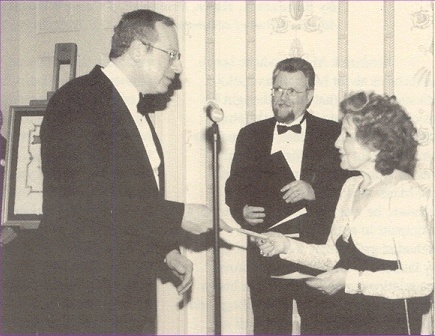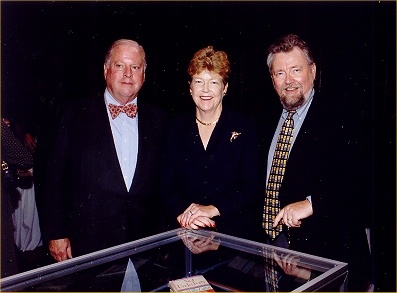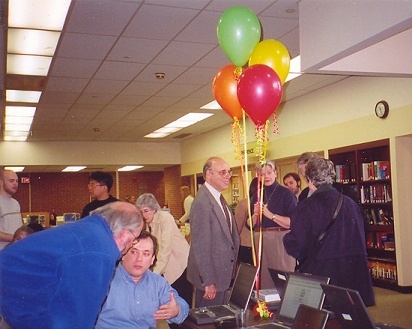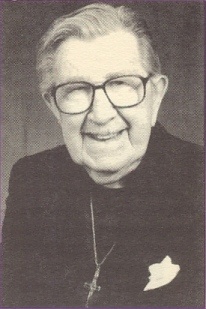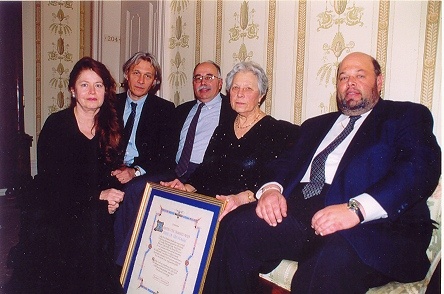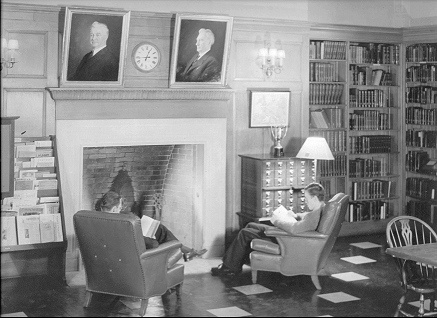| Table of Contents |
|---|
Professor Rose Receives Bela Kornitzer Prize
Professor Jonathan Rose is the recipient of the 2002 Bela Kornitzer Award for his highly acclaimed volume, The Intellectual Life of the British Working Classes (Yale University Press, 2001). Dr. Andrew Scrimgeour, Director of the University Library, made the announcement before a gathering of Friends of the Library at their biennial dinner gala held January 25. Dr. Rose was presented with the award and cash prize by Mrs. Alicia Kornitzer Karpati, who travelled from Florida for the occasion.
|
Mrs. Alicia Karpati presents the Kornitzer Award honoring her late brother to Professor of History Jonathan Rose in recognition of his book, The Intellectual Life of the British Working Classes. The occasion ws the Friends of the Library dinner gala held January 25 in Mead Hall. (Photo: Judi Whiting) |
Dr. Scrimgeour noted that "the book was over ten years in the making, twice the size of most scholarly books, yet riveting in style and substance, and gave Yale University Press fits when the initial run in the United Kingdom sold out in just a month. It chronicles the liberating role of books in the lives of ordinary workers in Victorian England based on primary source documents heretofore untapped."
Dr. Rose is Professor of History and Convener of the Graduate Program in Modern History and Literature at Drew. The Intellectual Life of the British Working Classes was heralded in the British press and has garnered several major awards in Britain and the United States, including the Longman-History Today's Historical Book of the Year Prize, "for stimulating a wider understanding and enthusiasm for history," the Jacques Barzun Prize in Cultural History of the American Philosophical Society, the British Council Prize of the North American Conference on British Studies, the SHARP Book History Prize, and the New Jersey Council of the Humanities Book Prize.
The Bela Kornitzer Award was endowed in 1992 by Mrs. Karpati and her late husband, George Karpati, to honor Mrs. Karpati's brother, a journalist and author in Hungary and the United States who was known for his political biographies. The award is given every few years to celebrate a work of non-fiction written by a Drew University faculty member or graduate judged outstanding by a Drew faculty committee. Books published in 2000 and 2001 were eligible for the recent competition for which twelve titles were nominated.
Dr. Rose is the fourth recipient of the prize: Professor Johannes Morsink is the previous winner for his volume, The Universal Declaration of Human Rights (University of Pennsylvania Press, 1999). Professor Janet Handler Burstein won the prize in 1997, for Writing Mothers, Writing Daughters: Tracing the Maternal in Stories by American Jewish Women (University of Illinois Press, 1996). And Professor Karen McCarthy Brown was the first recipient of the award, for Mama Lola: A Voudou Priestess in Brooklyn (University of California Press, 1991).
[
http://depts.drew.edu/lib/visions/visions13.php#top] |
Willa Cather Scholars and Fans Celebrate Unveiling of the Caspersen Collection
|
A scholarly presentation and reception celebrated the major collection of Willa Cather materials that was unveiled October 2, with donors Mr. Finn M. W. and Dr. Barbara Morris Caspersen, shown here with Dr. Andrew Scrimgeour, Director of the Library. (Hollander Photographic Services) |
Now Online ... Contemporary Authors database, with biographies and criticism of over 100,000 20th century and current authors whose works have been published in English. Call the Reference Desk at 408-3588 for more information, or check the Research Resources page of the Library website under "Online Reference Sources and Articles" for the humanities |
[
http://depts.drew.edu/lib/visions/visions13.php#top] |
Wireless Technology Comes to the Library
|
Academic Technology inaugurated its wireless network last fall when the Library became the first building on campus to be fully outfitted for wireless access to the computer network. Library technology coordinator Ginny Debbink assessed the impact on the Library: "This has been a spectacularly successful innovation, and the capability is now being widely used. We've had very few complaints--the system is virtually trouble free." (Photo: A. Magnell) |
|
THE DIRECTOR'S CORNER:Looking for Technology |
This past year, my family has been scouting out colleges with our daughter, a senior in high school. On campuses across four states, we followed genial student guides as they led us, with the perfected art of walking backwards, on scripted tours of featured buildings. Each one took pains to celebrate the easy availability of technology. Computer labs were conveniently lodged in all sectors of the campus, seemingly at every turn -- classroom buildings, campus center, dorms, and, of course, the library. Banks of luminous screens seemed as plentiful as the earnest palaver of our guides.
As I returned to the Drew campus from these junkets, I began to notice that technology is different here. It does not hit a visitor in the face as it does on other campuses. It does not call attention to itself. The reason is simple: Drew has invested in laptop computers rather than PCs. Each student is given one at matriculation, so computer labs and other publicly placed computers play a secondary role here. There are more computers on the Drew campus than on the campuses we were visiting, but they reside in student hands, rather than in highly visible public locations, and blend into the woodwork. This reality can wreak havoc in recruitment, where any perception of technology deficiency is the kiss of death.
The Drew Library continues to stay in the forefront of technology, thanks to its fruitful collaboration with Academic Technology. Last fall the Rose Library and the Learning Center were equipped as wireless facilities-the first on the campus-making student laptops even more powerful linkage tools for research as students tap the library catalog, databases, full-text resources, and the Internet, wherever they want to study in the Library. Yet again, this technological move is largely unobservable, hidden in the walls and air waves.
Believe it or not, technology is becoming less and less a differential in evaluating top-tier colleges and universities. Nationally ranked liberal arts colleges like Drew all have about the same range of electronic services and resources. Ironically, the badge of distinction among these schools is increasingly the size, range, and currency of the book collections.
This news is troubling in some quarters. Over the past twenty years, many college and university libraries sacrificed their book budgets in order to pay for the new technologies, believing that the book was about to be eclipsed by digital surrogates. Meanwhile, the publication of academic texts has grown rather than declined. Drew chose not to compromise its ability to build its book collections even while investing new dollars in technology.
Libraries with significant book collections are now feeling pressure from other libraries that need a steady infusion of loans and are adding significant fees for a service that was free for many decades. Drew continues to lend more books than it borrows--an indicator of the value of its book holdings. Our interlibrary loan department maintains a brisk pace in processing the requests for book loans from colleges, seminaries, and universities across the country.
Books and technology sit side by side at Drew, indispensable to the scholarly enterprise. Though one may be more visible than the other to the casual visitor, the discerning eye will see both.
-- Andrew D. Scrimgeour
[
http://depts.drew.edu/lib/visions/visions13.php#top] |
Recent Gifts to the Library
Friends' Library Gala
A warm thank you goes to all who contributed to the Book Endowment through the Friends' Biennial Dinner held January 25. The Library is especially grateful for the generosity of Mr. Donald Heft and Dr. Lynn Harris Heft, Mrs. Bard Thompson, Mrs. Noémi Kornitzer Neidorff and Mr. Michael F. Neidorff, and Mrs. Alicia Kornitzer Karpati.
Mr. Finn M. W. and Dr. Barbara Morris Caspersen have continued their stellar support for the Willa Cather Collection and the purchase of additional scholarly materials, including Cather novels with inscriptions and several letters written by the author.
The Library has received a generous gift from Mrs. Eleanor W. Rawitz for aesthetic improvements in the Reference Area.
Mr. Mark Di Paolo has donated a number of volumes which establish the Marc Di Paolo Collection of Graphic and Comic Novels. The materials are expected to be important for scholarly study in the future.
Ms. Alice B. Hoon has given the University a collection of theological volumes, many of which focus on the topic of prayer and are out-of-print.
Mr. Wayne R. Walton has made a much appreciated contribution through the Friends of the Library.
The Library gratefully acknowledges a generous gift from Ms. Marilyn Linden.
Dr. Linda Connors has donated to Drew some first edition Willa Cather novels.
Dr. Wolfang Jöchle has donated to the University his collection of German language books in literature, history, and social science.
Mr. Chris Hatcher has contributed a 20-year run of the journal, American Organist, from 1981-2001.
Dr. Jason Merrill donated several books, mostly in Russian, in the field of Russian literature and criticism.
In Honor of Dr. Eugene Zins
Ms. Marian Davis honored Dr. Eugene Zins on the occasion of his eightieth birthday with a gift to the Book Endowment.
In Memory of Morton Jay Harris
Among those who kindly sent gifts in memory of Morton Jay Harris, father of Dr. Lynn Harris Heft, are Gail and Kenneth Jaffe; Jane Benjamin and Frank Goodman; and Marilyn and Michael Dee.
In Memory of Dorothy Hulsart
The Woman's Club of Westfield contributed three gifts to the Endow-A-Book-Fund in memory of Dorothy Hulsart, a librarian at Drew who retired in 1978. Mrs. Hulsart was active in the Woman's Club, and chaired its Home Life and Social Services Department.
In Memory of Bernard Samuels
Rev. Dr. and Mrs. Owen E. Mercer are among the many contributors who have sent gifts in memory of Bernard Samuels, who worked for the Office of Facilities from 1964 until he passed away last spring.
In Memory of Susan Wijdenes
Library colleagues of Susan Wijdenes have contributed generously in her memory for the purchase of field guides for the reference collection that support the curriculum in botany and biology.[
http://depts.drew.edu/lib/visions/visions13.php#top] |
Remembering and Celebrating: Frederick E. Maser, 1908-2002By Kenneth E. Rowe, Professor of Church History
Address delivered at memorial service, Old Saint George's United Methodist Church, Philadelphia, September 22, 2002
Frederick Maser, whose books and lectures about Methodists spoke with such clarity that some thought he was on a first-name basis with John Wesley, died in Scottsdale, Arizona, his home in recent years, during the first week of April in 2002 in his 94th year. Fred Maser was not just a gifted historian; he was also a beloved pastor, a participant in national and world Methodist gatherings, a leader in this city lauded for his efforts to improve race relations, a collector of rare books and manuscripts, a patron of college and university libraries, and above all a friend. That is why we are gathered here today, to celebrate this unique life-- not so much taken from us as given to us. Those of us who knew him were changed by him: instructed by his writings, cheered by his anecdotes, inspired by his generosity, lavished by his hospitality. He will be missed.
|
Frederick E. Maser |
Maser was born in Rochester, New York February 26, 1908, the son of a Methodist clergyman. Educated in the public schools of Buffalo, Baltimore, and Schenectady, he received degrees from Union College and Princeton Theological Seminary, and was twice awarded honorary doctorates. Ordained to the ministry in the Methodist Episcopal Church in 1933, he joined the Philadelphia Conference, now the Eastern Pennsylvania Conference of the UMC. Philadelphia pastorates followed, from humble Alice Focht Church, Birdsboro through prestigious St. James Church, Olney. During his pastorate at St. James Church he met and married Mary Louise Jarden--a marriage that lasted until her death on December 28, 2000. In the middle of his ministry Maser became superintendent of the churches in the Northwest District.
But it was here, at Old St. George's Church, during a ten-year pastorate that followed, where Maser's passion for Methodist history and ability to raise money blossomed. Fred spruced up the church and its museum, invited Methodist leaders from around the world to preach, spread St. George's story by press releases and preaching tours across the country and beyond. Visitors came in large numbers. Many still reminisce about how he made history live for them. Another of his accomplishments was the establishment of the St. George's Gold Medal, awarded annually to clergy and lay persons for distinguished service to Methodism. Maser himself received the medal at the close of his pastorate. After a well-earned sabbatical, studying and preaching his way across Europe in 1968, Maser returned to Philadelphia, taught homiletics at Conwell School of Theology for a year, after which a grateful Bishop Corson appointed him director of public relations for the Conference. From this post Maser retired in 1973.
Among Maser's books, published over a writing lifetime of almost fifty years, are: The Dramatic Story of Early American Methodism (1965), Methodism in Central Pennsylvania (1971), Life of Robert Strawbridge (1983), and The Story of John Wesley's Sisters (1988). He edited The Journal of Joseph Pilmore (1968), founding pastor of this church, and contributed to a number of other works: The History of American Methodism (1964) , Encyclopedia of World Methodism (1974), United Methodism in America: A Compact History (1982, revised 1992) and If Saddle Bags Could Talk: Methodist Stories and Anecdotes (1998). For many years Maser wrote the "Discovery" column for the journal, Methodist History. He was the first recipient of the United Methodist Commission on Archives and History's Distinguished Service Award.
Books were our bond. I collected books for a living; the Masers collected books for fun. What fun they had visiting bookshops, poring over catalogs, attending auctions. Here's Fred on the prowl:
Leary's was, at the time [1960s], a Philadelphia landmark. It was located on Ninth Street at an alley that bisected Gimbels Department Store. It had four huge floors of old books, and its trademark was a Pickwickian figure standing on the top of a ladder in a library holding a book between his knees and another under one arm while, at the same time, scanning a volume he had just taken from the shelf. I always entered Leary's in a state of suppressed excitement. One never knew what treasure might turn up in that labyrinth of bookshelves.
On this day I rode the rickety elevator with its metal folding door to the religious book department on the fourth floor. A red headed clerk looked up and said, "You're the man who collects Wesley."
It was a statement rather than a question.
"I have a life of Wesley that just came in. You can have it for $2.50." She drew a small thick book off a shelf and handed it to me.
I looked at the book in temporary disappointment. It was a green, cloth-covered commonplace edition of Southey's Life of Wesley, published in London in 1864. I was about to hand the volume back to her when a natural curiosity prompted me to open it. On the half title was scrawled a comment. "I have nearly finished reading Southey's Wesley, which is a very superficial concern indeed; interesting of course. He does not treat it historically in its connection with the age, and he cannot treat it theologically if he would. I do not like Wesley--putting aside all his exceeding self-confidence, he seems to me to have a black self will, a bitterness of religious passion, which is very unamiable. Whitefield seems far better. [signed] J. H. Newman."
I bought the book at once and hastened to Miss Mabel Zahn at Sessler's Book Shop. At that time she was the most knowledgeable book dealer in the country. She noted the date of publication, studied the hand- writing carefully, made some comparisons with available data and nodding her head said, "It's hard to be certain, but it looks to me as though you have purchased a little gem."
I was tremendously excited to have found a comment on Wesley that may have come from the pen of the famed Cardinal who in 1845 had transferred his allegiance from the Anglican to the Roman Catholic Church.
Even more than collecting books, the Masers enjoyed giving them away. To Bryn Mawr they gave early American bindings; to Mount Holyoke, Christina Rossetti; to Temple they gave Bibles; to Southern Methodist, Wesley manuscripts; and to my university, Drew, they gave not one but two splendid collections--their 400-item Wesleyana collection, at the time the largest and finest library of its kind in private hands, and a superb collection of Anglican prayer books, ranging from the first Edwardian prayer book of 1549 down to the then-proposed prayer book of the American Episcopal Church.
From the beginning of my thirty-two year tenure as Drew's Methodist Librarian, the Masers were gracious in hospitality and generous in giving. Their giving never stopped. Even after the big gifts of 1977, the couple continued to finance the purchase of additional items for both collections. And, as a final gesture upon his death, a generous bequest established the Mary Louise Jarden and Frederick E. Maser Book Fund for the preservation and expansion of the rare book collections of Drew University Library.
Touching the splendid collections Fred and Mary Louise assembled and added to several college and university libraries, I can only prayerfully wish they were not unique. It is not just that the materials they assembled and donated are so distinctively valuable, which they are; but the love and joy of the collecting are so keenly evident in the collections, in the fine bindings, one wishes for more pursuers of "sleepers" [valuable, possibly rare books that appear at auction, but for some unknown reason are overlooked by bidders] and "association copies" [books once owned by a famous person]. If only they could be as intelligently informed and as generous in sharing the fruits of their efforts and the fun of the search. No wonder they command our fondness and our respect.
Thanks be to God for giving us Fred and Mary Louise Maser!
He was like a house with many mansions: There was room in him for many interests that were seemingly incompatible. But while they may have been at odds with one another, all of them were compatible with Fred....There was room in Fred's life for a host of friendships-for persons who may have been incompatible with one another, but all of whom were compatible with Fred.... Fred was a student of history, a persistent researcher and a polished writer; he also was a polished ballroom dancer. Fred was a pastor, a district superintendent, a General Conference delegate; he also was a man of elite clubs-a man of the world. Fred studied John Wesley and assembled a major Wesley collection, which he presented to Drew University; he also savored Scotch whiskey. |
Highlights from the Friends of the Library Dinner Gala
|
The Friends of the Library paid tribute to the life and work of the late Robert L. Chapman, Baldwin Professor of Humanities and Professor of English, Emeritus at its biennial fund raising dinner held January 25. The linguist was widely known as editor of two editions of Roget's International Thesaurus, as well as other noted lexicons. Mrs. Sarah Chapman served as Honorary Dinner Chair, pictured here with sons, Mark Chapman, of Nashville, T.N.; Doug Chapman of Pelham, N.Y., Geoffrey Chapman of Paterson; and daughter-in-law, Denine Rowan Chapman. The Friends of the Library presented the family with a specially commissioned illumination of a poem written by Chapman, entitled "Library." Chapman had also served on the Friends of the Library Advisory Board as one of its founding members. |
Library Exhibits
Main Library
April 7-May 7, 2003From BC to CLA:
75 Years of Adventures in Excellence
Memorabilia from the University Archives celebrating the 75th anniversary of the College of Liberal Arts.
May 8-June 30, 2003
Landscapes by Rick Mullin, C'80
August 11-October 31, 2003
Celebrating the John Wesley tercentenary with treasures from the Methodist Library and Archives
December 1, 2003-February 28, 2004
When Hate Became Law: Lessons from the HolocaustDocuments, artifacts, and artwork from the Drew University Center for Holocaust/Genocide Study, donated by Drew alumnus and collector, Andrew Liput, Esq., C '84. Curated by architect Gerald Gurland.
|
The Brothers College Library, circa 1930s. Portraits of the Baldwin brothers hang over the mantle in the inviting warmth of the BC library, now an art gallery. The photograph and other documents from the University Archives are part of an exhibit looking back on the College's 75-year history; on view in the Library through May 7. Part of the exhibit continues through June in the Reference area. (Photo: Drew University Archives) |
Methodist Archives Center
January-July, 2003
Health Care in the United Methodist Tradition
August 11-October 31, 2003
Wesley in America: An Exhibit Celebrating the 300th Anniversary of the Birth of John Wesley. Curated by the Bridwell Library, Perkins School of Theology, Southern Methodist University.
November 1-26, 2003
Methodist History Exhibit from the collection of the United Methodist Archives
December 1, 2003-February 28, 2004
When Hate Became Law: Lessons from the Holocaust
About Visions
VISIONS
NEWSLETTER OF THE DREW UNIVERSITY LIBRARY
Dr. Andrew D. Scrimgeour, Director
Drew University Library, Madison, NJ 07940
(973) 408-3322 ascrimge@drew.edu
EDITOR: Anna S. Magnell
PHOTOGRAPHS: Hollander Photographic Services, Judi Whiting, A. Magnell, Drew University Archives
THIS ON-LINE EDITION: Anne L. Noss
A complete online archive of past issues of Visions
can be viewed at:https://uknow.drew.edu/confluence/display/Library/Visions+Library+Newsletter+Archive
VISIONS is a semi-annual publication.
© Drew University Library

